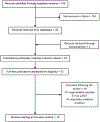The effects of cognitive remediation in patients with affective psychosis: A systematic review: Special Section on "Translational and Neuroscience Studies in Affective Disorders". Section Editor, Maria Nobile MD, PhD. This Section of JAD focuses on the relevance of translational and neuroscience studies in providing a better understanding of the neural basis of affective disorders. The main aim is to briefly summaries relevant research findings in clinical neuroscience with particular regards to specific innovative topics in mood and anxiety disorders
- PMID: 30878159
- PMCID: PMC6591034
- DOI: 10.1016/j.jad.2019.03.047
The effects of cognitive remediation in patients with affective psychosis: A systematic review: Special Section on "Translational and Neuroscience Studies in Affective Disorders". Section Editor, Maria Nobile MD, PhD. This Section of JAD focuses on the relevance of translational and neuroscience studies in providing a better understanding of the neural basis of affective disorders. The main aim is to briefly summaries relevant research findings in clinical neuroscience with particular regards to specific innovative topics in mood and anxiety disorders
Abstract
Background: Schizophrenia, schizoaffective disorder, and related illnesses are associated with significant impairment in cognitive functioning which is among the strongest predictors of disability and poor quality of life. Cognitive remediation (CR) was developed as a set of behavioral interventions directly targeting cognitive symptoms. Studies have shown that CR produces cognitive improvements in patients with schizophrenia and bipolar disorder that may be associated with improvements in functioning. However, the relative efficacy of CR across diagnoses has not been established. Indirect evidence suggests that CR is effective in patients with affective illness as well as patients with schizophrenia (SZ); however, the one study to evaluate the effects of diagnosis on outcomes directly in patients with SZ versus schizoaffective disorder (SZA) found no differences by diagnosis.
Methods: In this systematic review, we evaluated cognitive and functional outcomes after CR in studies including patients with SZA, and examined specificity of training content to outcomes.
Results: Sixteen studies met inclusion criteria: 10 studies that compared CR to a control condition (n = 779) and 6 comparative effectiveness studies. None of the studies explicitly compared patients by diagnosis. Studies included a mixture of patients with SZA or SZ. Of the CR versus control studies, effect sizes for cognitive outcomes were moderate-large (d = .36-.94). Studies comparing CR paradigms targeting different cognitive domains showed specificity of training focus to outcomes. Five of studies reported significant functional improvement after CR as secondary outcomes.
Conclusions: In this review, we found support for the use of CR paradigms in patients with affective psychosis, with evidence that reported treatment effects in mixed affective and non-affective samples are at or above the levels previously reported in SZ. However, lack of availability of data directly comparing patients by diagnosis or examining moderator or mediator effects of diagnosis or diagnosis-related patient characteristics limits our understanding of the relative efficacy of CR across patient group.
Copyright © 2019 Elsevier B.V. All rights reserved.
Conflict of interest statement
Conflict of Interest
BB is Senior Scientist at Posit Science, a company that produces cognitive training software. The other authors report no conflict of interest.
Figures
References
Publication types
MeSH terms
Grants and funding
LinkOut - more resources
Full Text Sources
Miscellaneous


